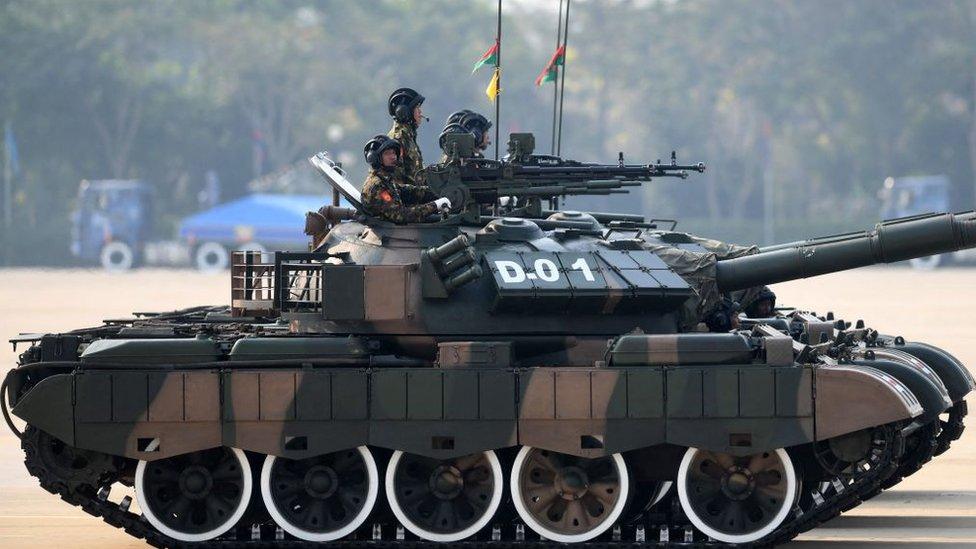Myanmar's military-ruled capital attacked by drones
- Published

Myanmar's military took over the country in a coup in 2021
The opposition in Myanmar has claimed a rare mass drone attack on the country's embattled junta government in the heavily guarded capital, Nay Pyi Taw.
The National Unity Government (NUG) - which calls itself the government in exile - said it deployed 29 drones armed with explosives to the airport, air force base and army headquarters.
The junta said it had intercepted the drones, shooting down seven, including one which exploded on a runway.
There were no casualties, they said,
The NUG represents the elected civilian government previously led by Aung San Suu Kyi, which was toppled in a coup in 2021.
Since then it and other opposition groups have been fighting the junta regime, which has begun losing control of large areas of the country.
The country's three-year civil war has killed thousands and displaced about 2.6 million people according to the UN.
Thursday morning's attack on the capital marks another bold, and rare incursion by the resistance groups who are mounting an increasingly effective opposition to the junta.
Nay Pyi Taw is the centre of power for the military regime which named it the capital, replacing Yangon, after it came to rule. Heavily guarded, it has been shielded from much of the fighting that has raged elsewhere across the country.
Last week, the junta even staged its annual Armed Forces Day parade in the city - but the event which showcased tanks, armoured vehicles and thousands of soldiers took place at night.
On Thursday, representatives from the NUG told BBC Burmese they had planned and strategised with several defence groups to conduct the drone attacks.
"The synchronised drone operations were simultaneously executed against Nay Pyi Taw targeting both the military headquarters… and Alar air base," NUG's deputy secretary Mg Mg Swe said.
The military reported shooting down four drones at the airport in the capital and three drones which it said approached Zayarthiri township. Officials made no reference to the other drones reported by the opposition.
The NUG earlier this year said more than 60% of the country's territory is now under the control of resistance forces.
Before Thursday's attack, the regime was seen to have suffered its most serious setback last October.
An alliance of ethnic insurgents overran dozens of military outposts along the border with India and China. The junta has also lost large areas of territory to insurgents along the Bangladesh and Indian borders.
The fierce fighting has pushed the junta to enforce mandatory conscription. In February - where men aged 18 to 35 and women aged 18 to 27 - would be forced to enlist.
Observers have said the enforcement of the law reveals the junta's diminishing grip on the country, and the high toll in fighting. There have also been reports of high defection rates.
The Tatmadaw, as the military is known, has not publicly declared the size of its fighting force in recent years.
However the junta still retain significantly more weapons and more advanced firepower than the resistance fighter groups.
As such, opposition groups have pivoted to using commercial drones carrying bombs to target military holds, researchers say. There have been several such "drop bomb" attacks in recent months.
